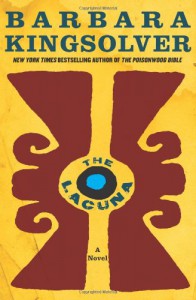Currently reading
Hieroglyph: Stories and Blueprints for a Better Future
Ukraine: Zbig's Grand Chessboard & How the West Was Checkmated
The Girl on the Train: A Novel
Our Souls at Night: A novel
Above the Waterfall
On Writing: A Memoir of the Craft
Designs on Film: A Century of Hollywood Art Direction
The Homicide Report: Understanding Murder in America
Dead Wake: The Last Crossing of the Lusitania
The Gods of Mars
 The Lacuna is really two books. One, the latter, is quite engaging, with a well-written historical perspective, emotional content, a bit of action. The other is an overlong back story, very light on involvement, written as if the author was watching the events and characters from behind a cloud. Considering that the stable of characters includes Diego Rivera and Frida Kahlo, it takes some effort to make them dull.
The Lacuna is really two books. One, the latter, is quite engaging, with a well-written historical perspective, emotional content, a bit of action. The other is an overlong back story, very light on involvement, written as if the author was watching the events and characters from behind a cloud. Considering that the stable of characters includes Diego Rivera and Frida Kahlo, it takes some effort to make them dull. The Lacuna is Kingsolver’s attempt at a grand historical novel. She begins in 1929 in Mexico, introducing Harrison William Shepherd, son of an American father and a Mexican mother, as a young lad dragged along by mom to live with her boyfriend on an island off the Mexican coast. We follow him through adolescence, through his association with Diego Rivera, Frida Kahlo, Leon Trotsky and a host of lesser characters. He connects briefly with his father in Washington DC and is enrolled in a private academy where latent interests come to the fore.
My favorite passage in the book occurs then, a thrilling scene of MacArthur and Patton attacking American WW I veterans who were demanding the payment that had been promised to them for their participation in World War I, the Bonus Army. Things do not become compelling again until many years later when Shepherd moves to North Carolina and begins his literary career. We first meet the wonderful, warm, Violet Brown there and it is her energy as much as Shepherd’s that carries us through to the end. That journey includes a chilling look at the McCarthy era, one that carries far too much resonance of today’s psycho-right. That works very well.
The methodology here is to present archivist notes from Violet Brown, excerpts from HWS’ journals and letters to and from him from other characters. The varying voices work well.
There is much beautiful writing here, rich imagery. And Kingsolver works her title, finding relevant lacunae images in lava tubes, blank spaces on a page and a part of Chichen Itza that is called the “mouth of the world,” among others. I was impressed by her comparison of the Bonus Army battle with the Spaniards’ attacks on New World locals several centuries prior.
Overall The Lacuna is a good book that could have been much better with significant editing. It makes one wonder if Kingsolver has enough juice to reject a demand for editing, a la Stephen King. If so, she should rethink that position. Even though there is worthwhile historical content within, and although it is very engaging in parts, The Lacuna is rather dull for far too much of its five-hundred-plus pages, which constitutes a rather glaring hole.












